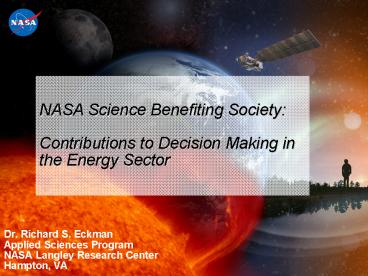Dr. Richard S. Eckman - PowerPoint PPT Presentation
1 / 21
Title:
Dr. Richard S. Eckman
Description:
Title: Understanding and Protecting Our Home Planet Author: SAIC ODIN Last modified by: Erin Dragatto Created Date: 3/13/2003 5:36:49 PM Document presentation format – PowerPoint PPT presentation
Number of Views:124
Avg rating:3.0/5.0
Title: Dr. Richard S. Eckman
1
NASA Science Benefiting SocietyContributions
to Decision Making in the Energy Sector
- Dr. Richard S. Eckman
- Applied Sciences Program
- NASA Langley Research Center
- Hampton, VA
2
Stage Setting Questions
- What is NASAs role in energy management?
- How are NASA space-borne measurements and models
used to contribute to decision making in the
energy sector? - How will NASA science be used to address climate
change impacts in the energy sector?
3
Climate Change in the News
Greenland Ice Sheet Accelerated Flow
4
Climate Change in the News
5
Climate Change in the News
6
Stage Setting Questions
- What is NASAs role in energy management?
- How are NASA space-borne measurements and models
used to contribute to decision making in the
energy sector? - How will NASA science be used to address climate
change impacts in the energy sector?
7
2006 NASA Strategic Plan
NASA Strategic Goal 3 Develop a balanced overall
program of science, exploration, and aeronautics
consistent with the redirection of human
spaceflight program to focus on exploration.
NASA Sub-Goal 3A Study Earth from space to
advance scientific understanding and meet
societal needs.
8
NASA Applied Sciences Program
- NASA partners with national organizations and
Federal agencies to extend NASA Earth science
research results into decision support tools to
benefit U.S. and global citizens.
9
Current NASA Research Spacecraft
November 16, 2004
10
NASA ResearchSpacecraft inFormulation/Developme
nt
11
Applications of National Priority
Public Health
12
NASA Applied Sciences Program
13
Stage Setting Questions
- What is NASAs role in energy management?
- How are NASA space-borne measurements and models
used to contribute to decision making in the
energy sector? - How will NASA science be used to address climate
change impacts in the energy sector?
14
NASA Energy ManagementPOWER Project
- Objective Improve the Nations public and
private capability for integrating environmental
data into sound management of energy production
and energy efficiency systems. - Goals
- Establish partnerships to facilitate the
integration and adaptation of NASA satellite
analysis and modeling data into electric power
industry Decision Support Systems (DSS) and
databases. - Target such datasets for Electric Power,
Renewable Energy, Energy-Efficient Building
Design and Biomass Crop Development Industries - Transition operational capabilities to government
and/or private sector entities.
15
POWER Historical Data for Renewable Energy
Earth-Sun System Science
Applied Science Outcome
NASA Satellite Measurements, Analysis and Modeling
Surface Meteorology and Solar Energy (SSE)
Datasets And Web interface
Terra
Aqua
SRB
GMAO
SSE Web Site
http//eosweb.larc.nasa.gov/sse/
Over 200 solar energy and meteorology parameters
averaged from 10 years of data
Growing over the last 5 years to nearly 14,000
users, nearly 3.6 million hits and 700,000 data
downloads
16
NASA POWER Project Logistical Approach
NASA Input Sources
Satellite-Based Retrievals and Analysis (ISCCP,
SRB, CERES)
Data Assimil- ation (GMAO, NOAA NCEP)
POWER Integration and Algorithm Benchmarking
Forecast Models (Days to Decadal) (NASA GMAO,
NSIPP, NOAA)
17
NASA POWER Partnership ExampleRETScreen from
Natural Resources Canada
Natural Resources Canada RETScreen
Photo Credit Green Mountain Power Corporation/
NRELPix
RETScreen Design System (gt68,000 Global Users)
Solar Water Heating
18
Future Directions Renewable Energy / Energy
Efficiency
- Biomass, geothermal, and hydropower
- Develop closer links with sustainable buildings
through relevant societies (e.g., Green Building
Council, ASHRAE, AIA) - Bioenergy Crop yield forecasting surface solar
radiation impacts, site assessment - Renewable resource forecasting short-term to
seasonal forecasting (e.g., precipitation,
run-off)
19
Stage Setting Questions
- What is NASAs role in energy management?
- How are NASA space-borne measurements and models
used to contribute to decision making in the
energy sector? - How will NASA science be used to address climate
change impacts in the energy sector?
20
Future DirectionsRegional Climate Impacts
- Changes in typical climatological patterns and
their impact on energy supply and load
forecasting - Temperature, precipitation, solar energy, wind,
etc. - Changes in storm frequency (event response)
21
NASA Energy ManagementConclusions and Future
Plans
- NASAs Energy Management Program is aimed at
transitioning improved satellite analysis and
modeling information to Decision Support Systems
(DSS) in the Energy sector. - Energy Managements POWER project has already
demonstrated the value of external partnerships
with DSS owners in the renewable energy and
energy efficiency areas. - New emphases on regional climate impacts, energy
efficiency, and bioenergy are being pursued.
22
Suggested Further Reading
- NASAs Energy Management Program Future Research
Directions - http//aiwg.gsfc.nasa.gov/esappdocs/evalreports/NA
SAEnergy.pdf - http//aiwg.gsfc.nasa.gov/esappdocs/evalreports/NA
SAEnergy2.pdf - My Personal Recommendations
- Lester Brown Plan B 2.0, Norton Co., 2006
- Brian Fagan The Little Ice Age, Basic Books,
2000






![book❤️[READ]✔️ Stephen King is Richard Bachman PowerPoint PPT Presentation](https://s3.amazonaws.com/images.powershow.com/10130132.th0.jpg?_=20240912026)
![book❤️[READ]✔️ Stephen King is Richard Bachman PowerPoint PPT Presentation](https://s3.amazonaws.com/images.powershow.com/10129134.th0.jpg?_=20240911091)























